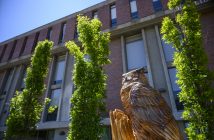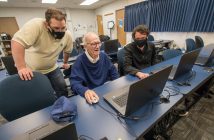Family creates scholarship through Westfield State Foundation, Inc. to memorialize their daughter.
Nancy S. Cavanaugh was a tow head when she was a young child, and she loved to dress up, sing and otherwise entertain her parents.
“She was just a little spitfire,” says her mother, Ellen Dalton of Beverly Farms, a community just outside of Boston.
By high school, Cavanaugh—“Nan” to those who knew her well—was a scholar and an ambassador. She loved her friends and her dog Nebraska, and she had a compassionate conscience and the ability to reach out to others who were less fortunate. She was the kind of girl who befriended students who were sitting alone in the cafeteria, the kind of girl who knew how to bring people into the fold.
“That was who Nan was,” Dalton says.
This lovely woman with a gift for helping others could not connect to the help she needed for herself, though. She battled depression, anxiety and obsessive compulsive disorder as a young adult, and in April 2012, one month before she would have received a master’s degree in social work from Westfield State University, Cavanaugh took her own life.
She was 24.
Dalton will never know what prompted her daughter’s decision, and she doesn’t want to focus on the fact that Cavanaugh’s needs went unmet by the mental health system.
Instead, Dalton wants to focus on the gifts her daughter gave to the world—and those she would have given if she had lived out her life. To keep her memory alive and to benefit other students with a passion for giving of themselves, Dalton, her three surviving children and Cavanaugh’s father, Derek Cavanaugh of Boston, have established The Nancy S. Cavanaugh Scholarship Fund.
This scholarship, administered by the Westfield State Foundation, Inc., will be awarded annually to a graduate student in social work in good academic standing, with financial need taken into account.
“We wanted to make sure there was some legacy that she left,” Dalton said. “She would have been an incredible social worker. She was smart. She was in tune with people and their needs, and she really had a passion for working with people, especially kids. It just seemed like, if we could give somebody else a leg up, that that would be very fitting.”
Cavanaugh earned her bachelor’s degree in psychology at the University of Massachusetts, Amherst, and after graduation, she worked for the Key Program Inc., a nonprofit organization in the Pioneer Valley of Massachusetts with a mission to assist troubled youth and their families in developing positive life skills and life experiences.
“She felt a calling to help. She was wonderful at relating to the girls at the group home, and they brought joy to her life,” Dalton says.
Dalton said her daughter loved thinking up new ways to engage the children in the program and often, on her way to work, she would stop to buy ingredients for a cooking project or the materials needed to make a particular craft.
“A co-worker said of her at the service held to celebrate her life that she was creative, imaginative and funny. This, combined with her empathy, made her a favorite of ‘her girls,’” Dalton says. “She was very involved.”
After earning her UMass degree, Cavanaugh knew she wanted to continue her education, but until she worked in the Key Program, she was unable to narrow the focus she wanted to have. Working with the youngsters helped her to define a focus on social work, and she turned to Westfield State because the University had a new social work program, and her parents were from Westfield.
In addition, Cavanaugh’s paternal grandfather, Joe Wise, lived in Westfield, and Cavanaugh wanted to be closer to him.
“There’s a lot of family history there,” Dalton says. “It was a natural fit.”
Dr. Robert C. Kersting, a professor of social work who knew Cavanaugh and her family, says she was an amazing young woman.
“She was extremely caring about the children she worked with. She was bright and hard-working. She had two classes with me and was never afraid to disagree with me or ask me why I believed something was true,” he says. “She forced us all to become better critical thinkers while never losing sight of the pain our clients experience.”
Kersting says Cavanaugh created a video for her Human Behavior and Social Environment class in which she interviewed her paternal grandfather. “This video was the talk of the program for both the quality of her work and the power of the relationship she had with her grandfather,” Kersting says, adding, “Nan is missed by all of us whose lives she touched.”
Kersting says the faculty and staff of the University were honored that Nan’s family wishes to develop a scholarship in her name; he sees it as a lasting tribute to her desire to help, her motivation and her “spunk.”
The first Nancy S. Cavanaugh Scholarship will be awarded in the spring of 2014. Dalton looks forward to being there.
“It’s about who Nan was,” she says. “She was somebody who could fill up a room. She had a huge voice, and she always spoke her mind and said her piece.
“The bottom line is she really was a very caring and loving young woman,” Dalton added. “If you were Nan’s friend, you felt her presence. She would have made a difference in peoples’ lives as a social worker. She was stubborn and determined and would insist on making things happen.”




